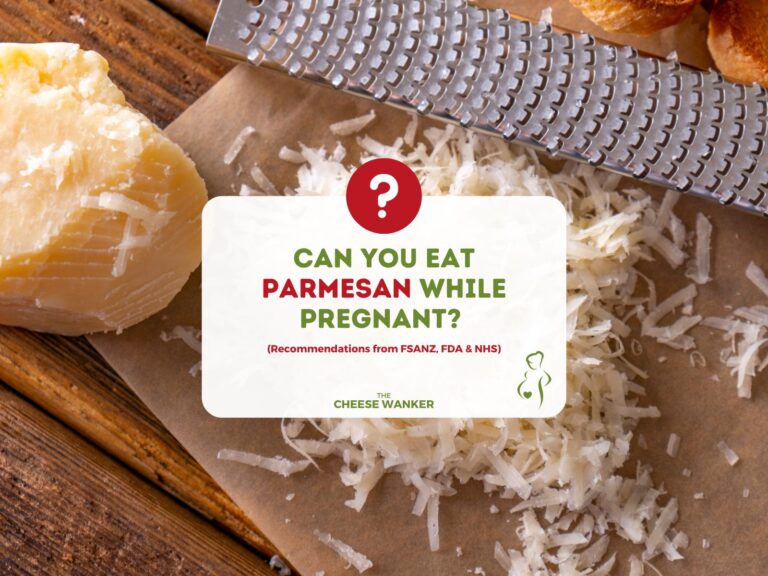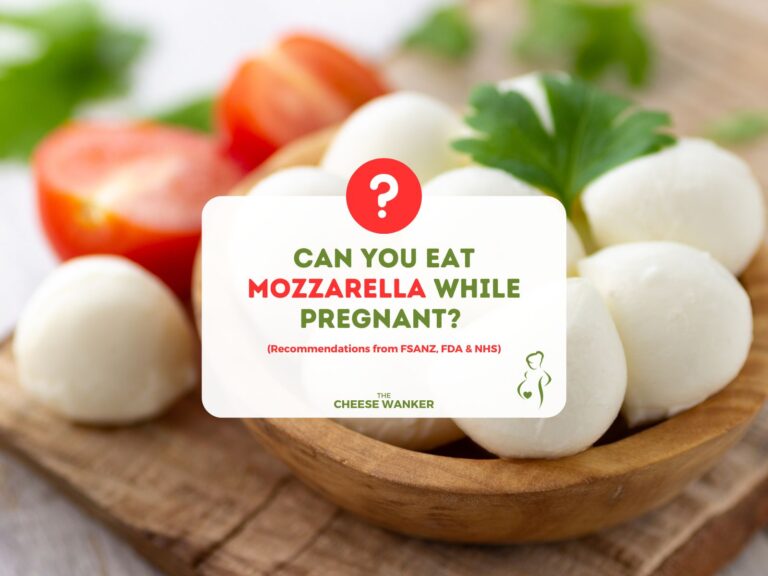Pregnancy brings its share of delightful cravings, but when it comes to indulging in Comté cheese, questions arise. In this post, we’ll explore the safety of savouring this French delicacy during those nine months and delve into the nutritional benefits of this iconic cheese. Read on to find out if you can safely eat Comté cheese during pregnancy.

SEE ALSO: Our complete guide to which cheeses you can eat during pregnancy →
The basics of pregnancy nutrition
During pregnancy, maintaining a well-balanced and nourishing diet is essential for the health and development of both the mother and the growing foetus. Optimal nutrients play a vital role as the foundational building blocks for the baby’s organs, bones and overall growth.
At the same time, these nutrients support the mother’s changing body and help meet her energy requirements.
You can read more about the specific dietary needs of a pregnant woman in this article here.
Should pregnant women eat cheese?
Incorporating cheese into the diet of a pregnant woman can be a nutritious choice, providing a wealth of essential nutrients crucial for both maternal and foetal well-being.
Cheese is celebrated for its calcium content, vital for the development of the baby’s bones and teeth. Furthermore, it delivers high-quality protein, supporting the growth of the placenta and the baby’s tissues.
Certain cheeses containing vitamin D enhance calcium absorption, promoting skeletal health. Additionally, cheese contributes to a well-rounded diet by supplying key nutrients such as phosphorus, B vitamins and zinc.
These nutritional advantages render cheese a convenient and versatile option for pregnant women, catering to their evolving nutritional needs and ensuring a diverse array of essential elements for a healthy pregnancy.
Can pregnant women eat all types of cheese?
Pregnant women are generally advised to exercise caution regarding specific types of cheeses. This is because some varieties carry a higher risk due to potential contamination with harmful bacteria like Listeria.
Soft cheeses with high moisture content such as Brie and Camembert may post an increased risk. And the same applies for blue cheeses which have a lower acidity like Stilton, Gorgonzola and Roquefort.
Additionally, unaged cheeses like Feta, Halloumi and Mozzarella are not recommended if made with unpasteurised milk, as they are also at a higher risk of contamination.
To ensure the safety of cheese consumption during pregnancy, it’s essential for expectant mothers to check labels for pasteurisation information, choose varieties with lower moisture content and practice good food hygiene.
What type of cheese of Comté?
Comté is a traditional French cheese that falls into the category of semi-hard, pressed cooked cheeses. It originates from the Jura region in eastern France and is known for its distinctive flavour profile. The latter can vary depending on factors such as the season, the cow’s diet and the duration of ageing.
Comté is typically aged for several months to a few years, resulting in a range of flavours from mild and nutty in younger cheeses to more complex and intense in older ones. It has a firm texture, a pale-yellow colour and is often used in various culinary applications.
Is Comté made with raw or pasteurised milk?
Comté cheese is traditionally made with raw, unpasteurised cow’s milk. The use of raw milk in making Comté cheese plays a crucial role in shaping its distinctive character.
Raw milk, straight from the cow, is rich in natural enzymes, beneficial bacteria and complex flavour compounds that contribute to the complexity and depth of Comté’s taste. You can read more about the importance of raw milk cheese in our blog post here.
While the use of raw milk brings richness and complexity to Comté, it’s essential to acknowledge that strict quality and safety standards are in place to ensure that the cheese is produced in a manner that minimises health risks associated with raw milk consumption.
The production process is carefully monitored to meet regulatory requirements, allowing enthusiasts to enjoy the unique qualities of Comté while maintaining a commitment to safety and quality.
Can pregnant women eat Comté?
Comté is generally considered safe for consumption during pregnancy according to health authorities worldwide. This is attributed to its extended ageing period and low moisture content.
Unlike unaged raw milk cheeses, Comté undergoes a meticulous production process that includes a lengthy maturation period, which helps reduce the risk of harmful bacteria. Additionally, its lower moisture content further contributes to its safety profile.
Given these characteristics, health experts often regard Comté as a safe option for pregnant women compared to certain other raw milk cheeses. Nevertheless, individual circumstances may vary, and it’s always advisable for expectant mothers to consult with healthcare professionals for personalised guidance.
Nutritional benefits of Comté

Comté not only tantalises the taste buds with its rich and complex flavour but also boasts several nutritional benefits. Here are some key elements that make Comté a noteworthy addition to your culinary repertoire:
Calcium content (993 mg)
Comté is a robust source of calcium, a mineral crucial for the development and maintenance of strong bones and teeth. This is particularly beneficial during pregnancy and for individuals looking to support bone health throughout their lives.
Protein powerhouse (25 g)
Packed with high-quality protein, Comté contributes to muscle development and repair. The protein content is not only beneficial for overall health but can be especially valuable during periods of growth, such as childhood and pregnancy.
Vitamin richness
Moreover, Comté contains essential vitamins, including B vitamins such as B12, which play a vital role in energy metabolism and neurological function. These vitamins contribute to overall well-being and support various bodily functions.
Phosphorus for bone health
The phosphorus content in Comté complements its calcium, further promoting bone health. Phosphorus is a key component in the formation and maintenance of bone structure.
Zinc boost
Additionally, Comté provides a source of zinc, an essential mineral involved in immune function, wound healing and DNA synthesis. Integrating zinc-rich foods into your diet, like Comté, can contribute to overall immune system support.
Rich in good fats (36 g total fat)
Comté contains healthy fats, including conjugated linoleic acid (CLA), which has been associated with potential health benefits, including anti-inflammatory and antioxidant properties.
Low lactose content (0 g)
Compared to fresh and unaged cheeses, Comté, due to its ageing process, has lower lactose levels. This makes it a more tolerable option for individuals who may be sensitive to lactose.
While Comté is undoubtedly a flavourful indulgence, it’s essential to enjoy it in moderation as part of a well-rounded and varied diet. As with any food, individual dietary needs and health considerations should guide its inclusion in your daily meals.
You can find our comprehensive assessment of the nutrition profile of Comté in this post here.
Pregnancy-friendly recipes using Comté cheese
Since pregnant women can safely eat Comté, it is no surprise that they can also use it in cooking. Here are three pregnancy-friendly recipes using Comté that are not only delicious but also packed with essential nutrients for expectant mothers.
Pregnancy-Friendly Quiche Lorraine with Comté

Craft a delightful Quiche Lorraine by incorporating Comté into this classic dish. This savoury quiche, safe and satisfying during pregnancy, includes a buttery crust filled with a luscious mixture of whisked eggs, Comté cheese and a delicious combination of ingredients.
Choose lean bacon or turkey bacon for that quintessential Quiche Lorraine flavour without compromising on health. Enhance it further with sautéed spinach for an extra nutrient boost.
The result is a creamy, flavourful quiche that not only satisfies cravings but also provides essential nutrients for both you and your growing baby. Enjoy this comforting dish as a hearty breakfast or a light dinner during your pregnancy journey.
Avocado and Comté Salad with Honey-Lime Dressing

Craft a refreshing salad by combining creamy avocado slices with cubed Comté, fresh spinach and roasted pecans. Drizzle with a zesty honey-lime dressing to create a vibrant and satisfying salad that’s bursting with flavour.
Comté and Vegetable Frittata

Whisk together eggs and fold in sautéed spinach for a nutrient boost. Add vibrant capsicums (bell peppers) for a pop of colour and sweet flavour. Toss in halved cherry tomatoes to bring a burst of freshness to each bite. Sprinkle generous amounts of Comté cheese over the top for a creamy and savoury finish.
Conclusion
As we conclude this exploration into the safety Comté during pregnancy, it’s evident that this exquisite French cheese can indeed be part of a wholesome and satisfying diet for expectant mothers.
Comté, with its unique flavour profile and rich nutritional benefits, offers a safe and delightful option when consumed mindfully.
The careful production processes, notably the extended ageing period and low moisture content, contribute to the safety of Comté during pregnancy. Health authorities worldwide generally consider it a favourable choice, adding a touch of indulgence to a balanced and diverse menu.
Whether enjoyed in a delicious frittata, as a creamy addition to salads, or incorporated into a pregnancy-friendly Quiche Lorraine, Comté proves to be a versatile and delicious companion on the journey to motherhood.
So, savour the richness of Comté in moderation, relish its nuanced flavours and let it be a delightful part of your culinary repertoire as you embrace the joys of pregnancy.
References
Safety in Pregnancy
All the advice relating to what cheeses you can eat during pregnancy in this article is based on the recommendations by health authorities in Australia, the UK and the USA. If you are unsure about what you can or cannot eat, please consult your doctor.
Australia – FSANZ, United Kingdom – NHS and United Sates of America – FDA
Nutritional content
The nutritional content of cheese in our table comes from the USDA Food Data Central Repository and cheese manufacturers. We realise that there can be variations between different brands and producers. Hence, the numbers we have used are averages.
Fat
Our fat RDI data comes from Cleveland Clinic’s Healthy Fat Intake resource.
Type of fat in cheese as per Harvard T.H. Chan’s The Nutrition Source.
Protein
Our protein RDI data comes from Harvard Medical School’s Harvard Health Publishing.



